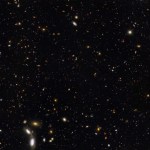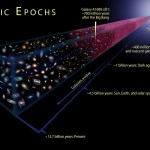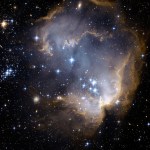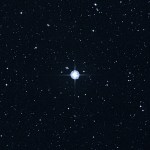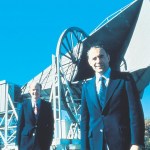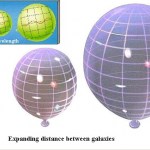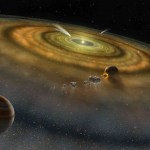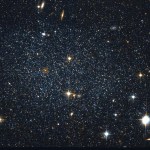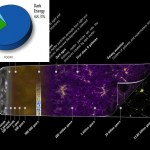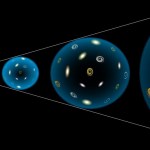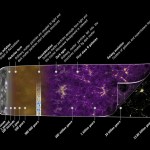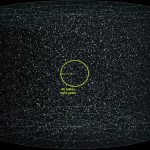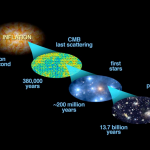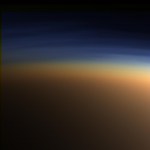Big Bang
“People are trapped in history and history is trapped in them.” -James A. Baldwin
We've come a long way since we first started watching the night skies. Even just a century ago, we thought our Universe was governed by Newtonian gravity and consisted only of our Milky Way and the stars inside.
Image credit: SDSS.
In the past 100 years, we've come to understand that our Universe is a vast, expanding-and-cooling space that formed planets, stars, galaxies and clusters from a past that was so hot and dense we didn't even have atoms, nuclei, or stable protons! There are a myriad of…
“To begin, begin.” -William Wordsworth
Is the Big Bang the greatest scientific achievement of the 20th century? I -- along with many others -- would argue that it is. It's something that even young children are curious about!
Image credit: David Burstein, of http://www.davidburstein.net/2012/10/07/quiver-trees/.
Perhaps it's in our nature to wonder about where we come from? Yet despite the fact that it's been half a century since the Big Bang was validated and its alternatives shown to be wrong, it remains a very difficult concept for most people to understand. More importantly,…
“Our feeblest contemplations of the Cosmos stir us — there is a tingling in the spine, a catch in the voice, a faint sensation, as if a distant memory, of falling from a height. We know we are approaching the greatest of mysteries.” -Carl Sagan
34 years ago, Carl Sagan became the first person to present -- in a format accessible to the entire world -- a synthesized story of all the most important scientific points and facts that we had learned about the cosmic story common to us all.
Image credit: NASA / GSFC, via http://cosmictimes.gsfc.nasa.gov/universemashup/archive/pages/big_bang….
No…
“The paradigm of physics — with its interplay of data, theory and prediction — is the most powerful in science.” -Geoffrey West
So earlier this year, the BICEP2 team shook up the world by announcing the discovery of primordial gravitational waves: a signal from the earliest stages of the Universe, going all the way back to before the Big Bang!
Image credit:the BICEP2 collaboration, viahttp://www.cfa.harvard.edu/news/2014-05.
By looking at the photon polarization data, they claimed to have surpassed the gold "5σ" standard for announcing a discovery in physics. But recently, that's been…
Sure, the Big Bang is great. Going back to very early times, it tells us the Universe was in a hot, dense state, where even the possibility of forming neutral atoms was impossible due to the incredible energies of the Universe at that time. The patterns of fluctuations that are left over from that time give us insight into the primordial density fluctuations that our Universe was born with.
Image credit: NASA / WMAP.
But there's an additional signature encoded in this radiation, one that's much more difficult to extract: polarization. While most of the polarization signal that's present…
“I think one of the coolest things you can do is disappear for a while, because it gives you the chance to re-emerge.” -Josh Homme
The Big Bang -- and General Relativity in general -- teaches us that in an expanding Universe, it's the fabric of space itself that evolves over time. One of the consequences of this is a bit puzzling: that since the Universe was denser in the past, it must have been hotter in the past as well.
Image credit: NASA / GSFC.
But if each individual photon has redshifted to longer wavelengths, and the energy of every photon is inversely proportional to that…
“Let others praise ancient times; I am glad I was born in these.” -Ovid
With all that we know of astronomy, with the hundreds of billions of galaxies and hundreds of billions of stars in each that we know are there, it might surprise you to learn that the stars -- for the most part -- don't segregate themselves by age, but rather live together in well-mixed populations.
Image credit: European Southern Observatory’s Very Large Telescope, of Planetary Nebula IC 1295.
So how, then could we possibly hope to find the oldest stars that are out there? Believe it or not, we have more than just a…
“We were marching down the street, & we were at the head of the troops. We went on marching, & the troops went off to the left.” -Geoffrey Burbidge
It's such a part of our cosmic and scientific history, that it's difficult to remember that it's only been for the past 50 years that the Big Bang has been the leading theory-and-model that describes our Universe.
Image credit: Edwin Hubble, 1929.
Ever since the 1920s, when Edwin Hubble discovered the apparent expansion of our Universe, we've recognized that it's a much bigger place than simply what's in the Milky Way. But the Big Bang…
“The mind, once expanded to the dimensions of larger ideas, never returns to its original size.” -Oliver Wendell Holmes
But it isn't just your mind that expands as time goes on and you increase your knowledge, but the entire Universe as well. General Relativity, as it turns out, doesn't leave us with much of a choice. If you start with a Universe full of matter and radiation, it's got to expand, otherwise it will collapse in on itself!
Image credit: James N. Imamura of U. of Oregon.
But this expansion has consequences of its own, including the surprising fact that there's not only a…
“It surprises me how disinterested we are today about things like physics, space, the universe and philosophy of our existence, our purpose, our final destination. It’s a crazy world out there. Be curious.” -Stephen Hawking
The story of where everything came from in the Universe -- of how we came from empty, expanding space to our rich and complex Universe-of-today -- is without a doubt the most remarkable story ever told: the story the Universe has to tell us about itself!
Image credit: Kfir Simon / Demetrius Gore, via http://www.pbase.com/tango33/image/140317019/original..
Although there…
“The nitrogen in our DNA, the calcium in our teeth, the iron in our blood, the carbon in our apple pies were made in the interiors of collapsing stars. We are made of starstuff.” -Carl Sagan
That might be true: all the heavy elements -- in theory -- were created after at least one generation of stars lived-and-died. But if we want to know what the Universe started off with, we have to find what the Universe was like before any stars formed.
Image credit: NASA, WMAP Science Team and Gary Steigman.
This is a seemingly paradoxical task: how can you find a signature of what the Universe…
“Whenever you have infinities in a theory, that’s where the theory fails as a description of nature. And if space was born in the Big Bang, yet is infinite now, we are forced to believe that it’s instantaneously, infinitely big. It seems absurd.” -Janna Levin
Of course, we don't believe space was born in the Big Bang, but this wasn't intuitive for a long time! Indeed, given the cosmic unknowns of inflation, dark matter and dark energy, and the fact that what we consider to be "normal matter" only makes up around 5% of the total amount of energy in the cosmos, isn't it time to revisit the…
“Science casts a long black shadow back over who we think we are, and where it falls the temperature falls with it. Its touch is chilly and unforgiving.” -Richard K. Morgan
Here on Earth, when we're dealing with normal matter, it's relatively easy to measure the temperature of something. Even if you don't have a thermometer handy, if you can do something like measure the speed/kinetic motion of the particles in there, you can easily figure out what the temperature of a system is.
Image credit: screenshot from Schooltube, of a video by mrcoia (Teacher),L A Webber High School.
But…
“These neutrino observations are so exciting and significant that I think we’re about to see the birth of an entirely new branch of astronomy: neutrino astronomy.” -John Bahcall
From the Hubble expansion of the Universe to isotropy and homogeneity to the light elements to the leftover radiation glow to the formation of large-scale structure in the Universe, the Big Bang is by far the most successful scientific description of the Universe of all-time.
Image credit: Illustris Simulation, M. Vogelsberger, S. Genel, V. Springel, P. Torrey, D. Sijacki, D. Xu, G. Snyder, S. Bird, D. Nelson, L.…
“In the beginning the Universe was created. This has made a lot of people very angry and been widely regarded as a bad move.” -Douglas Adams
So, you think you know about the beginning. About where everything came from, about how our Universe got its start. As my very blog is titled, it "Starts With A Bang," right?
Image credit: wiseGEEK, © 2003 — 2014 Conjecture Corporation, viahttp://www.wisegeek.com/what-is-cosmology.htm#; original fromShutterstock / DesignUA.
Except that's not truly the beginning of everything. The Big Bang was preceded by an epoch of cosmic inflation, and started…
“Physical reality does not require that we be pleased with its mechanism; we must see the implications of a theory for what they are and not for what we would like them to be.” -Kevin Michel
If you've been following along for a while -- particularly in light of the recent BICEP2 results -- you're well aware that not only do we understand the history of the Universe all the way back to a hot, dense expanding state, but we've gotten a window into what happened before that: there was a period of Cosmic Inflation!
Image credit: ESA and the Planck Collaboration, modified by me for…
“In the confusion we stay with each other, happy to be together, speaking without uttering a single word.” -Walt Whitman
With the new result out from BICEP2, and even more firm evidence for cosmic inflation in place, many of you must be wondering what this means for the Multiverse.
Image credit: Wikimedia Commons users Frédéric MICHEL and Azcolvin429, annotated by me.
From our observable Universe, we can learn an awful lot about the part that's unobservable, but is there anything we can say -- intelligently -- about other Universes that may have been created as a result of cosmic…
“I don’t think at this point we have any way of knowing where the laws of physics came from. We could hope that when we really understand the laws of physics that they will describe how the Universe came into existence.” -Alan Guth
So, since Monday's big story -- about the BICEP2 collaboration announcing the discovery of the signature of gravitational waves on the cosmic microwave background -- I realized that there are simply too many misconceptions and misunderstandings out there about cosmic inflation, the Big Bang, and how the whole story comes together.
Image credit: Bock et…
“If you put yourself in a position where you have to stretch outside your comfort zone, then you are forced to expand your consciousness.” -Les Brown
On the one hand, you've got gravitation, the most powerful force in the Universe, trying to attract all the matter in it together. If it had its way, not only would everything eventually merge together, but the Universe itself would recollapse!
Image credit: Eugenio Bianchi, Carlo Rovelli & Rocky Kolb, modifications by me.
But on the other hand, the Universe is not only expanding, but that expansion is accelerating, thanks to…
“Both the solutions must be rejected, and as these are the only statical solutions of the equations… the true solution represented in nature must be a dynamical solution.” -Willem de Sitter
First off, welcome, everyone! As you well know, the main Starts With A Bang blog has moved to Medium, something that's received mixed reviews from you, my longtime and most loyal of readers. Some people love the new layout, the larger images, and the ad-free experience, while others really miss the commenting features, the community we have here, and the ability to say whatever you like without a…
